From a new MRI scanner to a unique 3D laser printer to imaging and treating ovarian cancer, Wright State University faculty and students pursued important research endeavors in 2020.
Here are some of the top research stories that appeared in the Wright State Newsroom in 2020:
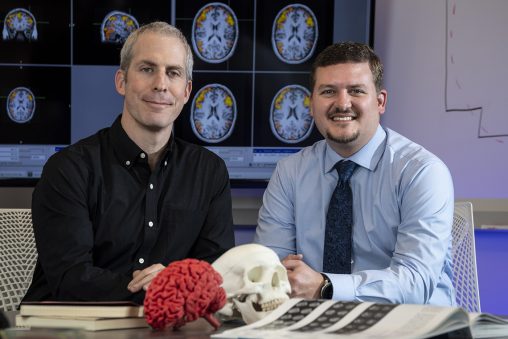
Assaf Harel, left, associate professor of psychology and a cognitive neuroscientist, and Matthew Sherwood, a research engineer in the Department of Biomedical, Industrial and Human Factors Engineering, successfully applied for funding to acquire an MRI scanner.
Wright State receives Defense Department funds to acquire advanced MRI scanner
Wright State University will soon be home to an advanced magnetic resonance imaging (MRI) scanner that promises to expand research and create a neuroimaging center for cognitive technologies. The Department of Defense provided the grant for the purchase and installation of a state-of-the-art 3 Tesla MRI scanner.
The MRI will be housed in the Joint DoD-WSU Center for Neuroimaging and Neuro-Evaluation of Cognitive Technologies in the Neuroscience Engineering Collaboration Building.
Having an MRI scanner at Wright State will enable Defense Department researchers and their academic partners to study topics like cognitive enhancement, fatigue mitigation, enhancing selection validity and increase training efficiency. Read more

Vance Saunders, director of Wright State’s cybersecurity program, will managed the Assured Digital Microelectronics Education and Training Ecosystem program.
Wright State wins Air Force contract to develop cybersecurity workforce
Leading a team of six Ohio academic institutions, Wright State University received an Air Force contract, titled Assured Digital Microelectronics Education and Training Ecosystem (ADMETE), worth over $29.75 million for three years, with $9 million released in the first year.
The contract seeks to develop a pipeline of trained undergraduate engineering students with the skills to design and develop digital microelectronic devices and systems. The program is managed by Wright State under the direction of Vance Saunders, director of Wright State’s cybersecurity program in the College of Engineering and Computer Science.
“These computer chips provide the processing power for everything we’re doing in technology right now,” Saunders said. “Most of them are manufactured outside the United States, and we don’t have the infrastructure to manufacture them all ourselves. We need to be able to assess the trustworthiness of this hardware.” Read more
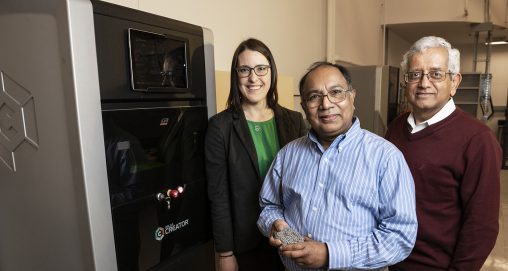
From left: Department of Mechanical and Materials Engineering faculty members Joy Gockel, Ahsan Mian and Raghu Srinivasan with the ORLAS Creator 3D printer.
Engineering students receive hands-on experience with 3D metal printer
Wright State engineering students had a rare opportunity to work with a 3D laser printer that produces complex metal parts with internal functions. The ORLAS Creator was used in a lab at the College of Engineering and Computer Science to help teach and train students in metal additive manufacturing.
“With this machine we are able to build shapes that you can’t build any other way,” said Joy Gockel, assistant professor of mechanical and materials engineering. “You are able to take the theory you learned in your fluid dynamics class and you can actually implement the theory into a design. You can create some really complex internal structures.”
The metal printer is used by graduate students to conduct research and in undergraduate additive manufacturing classes, with students exploring the power of the laser and how it influences materials. They made simple geometries such as cubes and a staircase-like object as well as sample parts such as gears and turbine blades. Read more

Lee Hannah, associate professor of political science, led a study that examined how political parties use websites and social media.
Study sheds light on political parties’ use of websites and social media
Fewer than half of all major county political parties around the nation have established websites, urban and suburban parties are more active with social media than their rural counterparts, and parties in battleground states have a stronger web presence.
These are among the findings in a national study conducted by faculty and student researchers at Wright State University and Miami University. The results of the study were published on the London School of Economics US Politics and Policy blog.
The researchers include Lee Hannah, associate professor of political science, and political science majors Austin Lucous and Whitney Tyler.
“I’m really proud that I could publish with some of our excellent students,” Hannah said. “I think it’s important that students have these opportunities and view themselves as professionals and social scientists even before they graduate.” Read more
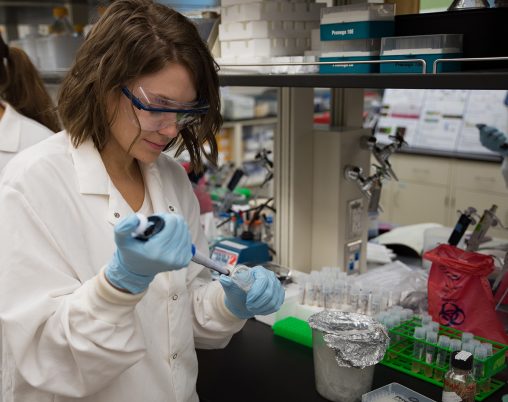
Christina Davis, a biochemistry and molecular biology major, works worked as a research assistant at the Air Force Research Laboratory.
Student researcher Christina Davis will participate in an exchange program in Singapore
Christina Davis, a biochemistry and molecular biology major, was selected to participate in the Asian Office of Aerospace Research and Development International Student Exchange Program in Singapore.
Davis has worked as a research assistant at the Air Force Research Laboratory as part of her job with UES, Inc., for which she earns credit hours at Wright State. She works in the 711th Human Performance Wing.
“I’ve worked on a range of molecular biology and microbial engineering projects and have had significant exposure to a variety of interdisciplinary techniques and topics, including cell-free protein synthesis and the role of the microbiome on human performance,” Davis said.
During her exchange program, Davis will spend 10 weeks next summer at the National University of Singapore in a synthetic biology laboratory. “I will be gaining experience in an advanced engineered probiotic laboratory and training in techniques applicable to AFRL,” said Davis. Read more
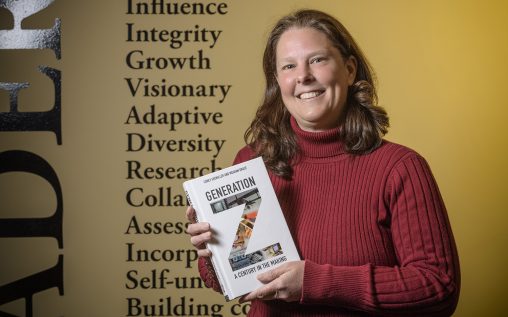
Corey Seemiller, associate professor of leadership studies in education and organizations, examined the potential impacts of the coronavirus on Generation Z.
Researcher Corey Seemiller gauges the potential impact of the coronavirus on Generation Z
The coronavirus pandemic had members of Generation Z questioning leaders, adjusting to remote learning, considering the freelance economy as a career path and determining the social causes they care the most about. These are some of the potential outcomes raised by Generation Z expert Corey Seemiller, associate professor of leadership studies in education and organizations.
The insights were examined in a series of articles written by Seemiller titled “How COVID-19 Could Change a Generation Forever” on The Gen Z Hub: Leading the Conversation on Generation Z. In the articles, Seemiller discusses the potential political, economic, psychological, sociological and social impacts of the coronavirus and COVID-19 on Gen Z. Read more
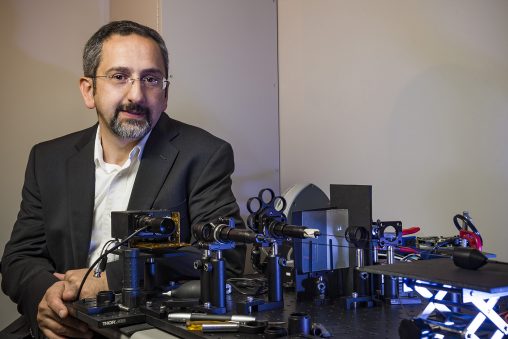
Ulas Sunar, director of the Biomedical Imaging Laboratory and associate professor in the Department of Biomedical, Industrial and Human Factors, is investigating new techniques to detect and treat small tumor nodules in ovarian cancer.
Researcher Ulas Sunar receives $1.7 million grant to demonstrate novel approach for imaging and treating ovarian cancer
Ulas Sunar, the Ohio Research Scholar and Endowed Chair in Medical Imaging, received a $1.7 million federal grant to develop novel endoscopic hardware and algorithms for imaging and treating ovarian cancer.
“Our approach is expected to significantly improve detection and destruction of small tumor nodules in ovarian cancer patients and reduce side effects in normal tissue such as the intestines and liver, thereby improving patients’ survival rates and quality of life,” Sunar said.
Sunar and his research team have built a new kind of flexible, fiber-based endoscope that can be inserted into a body cavity or organ. The endoscope features quantitative fluorescence imaging that can better detect lesions in internal organs compared to conventional fluorescence imaging and other imaging methods. Read more
Research team receives a $500,000 federal grant to accelerate manufacturing of thermoelectric materials
Joy Gockel, assistant professor of mechanical and materials engineering, and Tanvi Banerjee, associate professor of computer science, received a $500,000 grant from the U.S. Department of Energy to investigate a way to accelerate and improve the manufacturing of thermoelectric materials through additive manufacturing and machine learning.
Gockel’s research includes many aspects of additive manufacturing processing. Banerjee’s research includes multimodal data fusion and machine learning.
“The proposed approach will speed up the development process and allow for the use of additive manufacturing to make high-quality thermoelectric material. This method will also be applicable towards the development of different materials in the future,” Gockel said. Read more
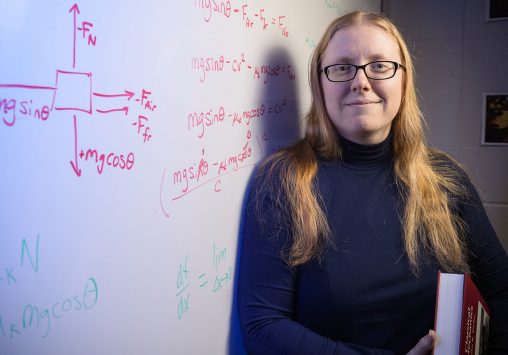
Adrienne Traxler, associate professor of physics, researched the sources physics faculty members are using to master remote teaching.
Physicist Adrienne Traxler receives federal grant to investigate remote teaching by physics faculty
Adrienne Traxler, associate professor of physics at Wright State University, received a rapid-response grant from the National Science Foundation to investigate how physics instructors around the nation managed the transition to remote teaching during the pandemic.
The grant supported a study titled Faculty Networks Supporting Rapid Transitions to Online Physics Teaching During the COVID-19 Pandemic.
Traxler sought to learn about the sources physics faculty members use to master remote teaching, including people, websites and social media.
“Along with mapping those networks, we want to see whether faculty members’ network connectivity is related to their anxiety level and self-efficacy in this teaching transition,” said Traxler. “In other words, has being well-connected helped people to cope with the challenges?” Read more
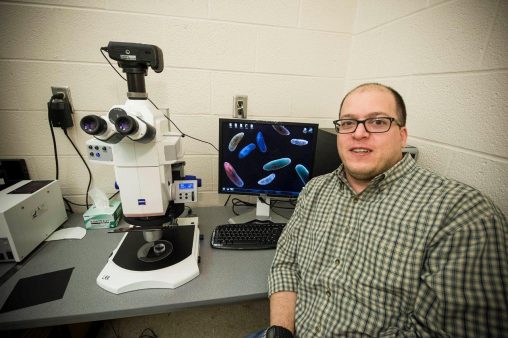
A research grant secured by Labib Rouhana, associate professor of biological sciences, was renewed by the National Institute of Child Health and Human Development.
Biologist Labib Rouhana receives grant renewal that prepares students for biomedical research
Wright State researchers received renewal of a $447,441 federal grant that supports biology courses in which students learn techniques that are fundamental to solving current biomedical challenges such as detecting coronavirus or developing a vaccine.
The award from the National Institute of Child Health and Human Development is for a project led by Labib Rouhana, associate professor of biological sciences, titled “Discovery of Germline Genes and Regulatory Networks in Planarians.”
The project is designed to identify genes with conserved functions in human reproduction and offer promise for breakthroughs in infertility. The researchers study the planarian flatworm, which can regrow its reproductive organs from stem cells.
One goal of the project is to provide students an opportunity to be involved in research.
“This formative experience translates into student preparedness for application of molecular techniques in basic research or in response to a pandemic like the one we face today,” said Rouhana. “Molecular biology techniques learned in the course are fundamental to coronavirus detection and vaccine development.” Read more
Business faculty win prestigious Ranyard Medal for analytics research
Raj Soin College of Business faculty members Anand Jeyaraj and Amir Hassan Zadeh received the Ranyard Medal from the Operational Research Society in the United Kingdom for their paper on the alignment of business and social media strategies published in the Journal of Business Analytics.
Jeyaraj is a professor and Zadeh is an associate professor in the Department of Information Systems and Supply Chain Management in the Raj Soin College of Business.
Jeyaraj and Zadeh received the inaugural award for their paper “Alignment of business and social media strategies: insights from a text mining analysis.” The paper used analytics to solve a common problem among businesses: strategic alignment, including the alignment between the overall strategy of the company and its social media strategy. Read more

 ‘Only in New York,’ born at Wright State
‘Only in New York,’ born at Wright State  Wright State president, Horizon League leaders welcome new commissioner
Wright State president, Horizon League leaders welcome new commissioner  Wright State celebrates homecoming with week-long block party
Wright State celebrates homecoming with week-long block party  Wright State baseball to take on Dayton Flyers at Day Air Ballpark April 15
Wright State baseball to take on Dayton Flyers at Day Air Ballpark April 15  Wright State joins selective U.S. Space Command Academic Engagement Enterprise
Wright State joins selective U.S. Space Command Academic Engagement Enterprise 